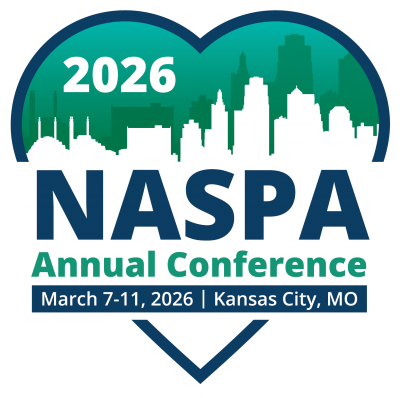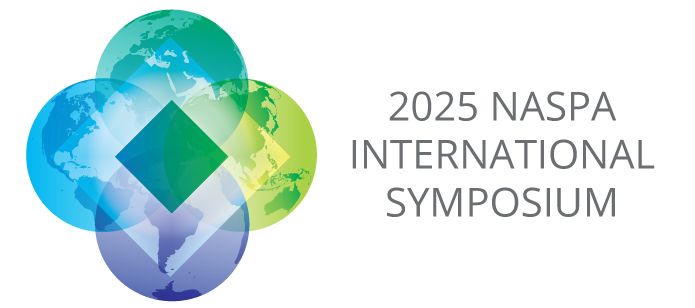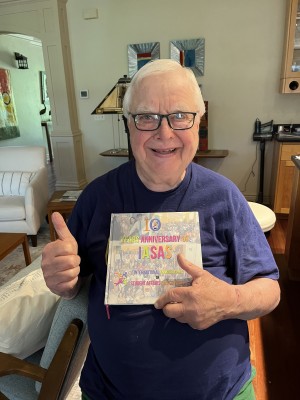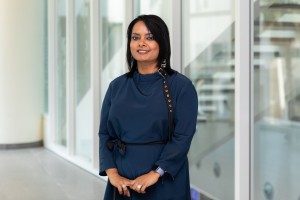2025 International Symposium
The NASPA International Symposium is a specialized pre -conference of the NASPA Annual Conference that brings together student affairs professionals, educators, administrators, and students from various countries to discuss and address issues pertinent to higher education and student services globally. The primary goal is to foster a global community of practice that enhances the effectiveness of student affairs professionals, enriches the educational environments, and ultimately supports the holistic development of students worldwide. (Global Division, International Education Knowledge Community (IEKC). The event format will include keynote presentations, concurrent sessions, interactive discussions, and networking opportunities.
Symposium Dates: Saturday 15 March and Sunday 16 March 2025
Location: New Orleans , USA - New Orleans Ernest N. Morial Convention Center
Friday 14 March 2025 | 2:00pm - 6:00pm
NASPA INTERNATIONAL SYMPOSIUM
The International Symposium serves as a dynamic platform for student affairs professionals globally to share insights, engage in meaningful dialogue, and network, as well as practitioners interested in further developing their global competency skills.
The NASPA International Symposium facilitates the advancement of global discussion and worldwide understanding of student affairs and services. A key International Symposium goal is to invite and explore new perspectives, and to create new connections to bridge international boundaries. In doing so, the International Symposium expands NASPA’s objective of providing professional learning opportunities to support preparedness for the realities of an increasingly globalized society.
The planning committee has developed a two-day schedule meant to engage and inspire action. You will start Saturday setting the stage for the rest of the weekend, engage with our keynote speaker, and connect with colleagues through networking opportunities. On Sunday, you will engage with experts who will be sure to motivate and inspire you through small group dialogues, breakout sessions and panel discussions. Topped off with plenty of networking opportunities, the NASPA International Symposium will provide you with motivational ideas, actionable steps, and opportunities to connect and learn from your peers.
LEARNING OUTCOMES
-
Learning Outcome 1
Develop increased awareness and knowledge of regional trends and international perspectives on student affairs and services.
-
Learning Outcome 2
Network with and learn from new contacts and colleagues from multiple regions of the world.
-
Learning Outcome 3
Consider opportunities to expand, enhance, and further advance global discussion and worldwide understanding of student affairs and services
-
Learning Outcome 4
Reflect on the 30 year history and evolution of the international symposium and its advancement of global issues in student affairs and services
SYMPOSIUM TRACKS
-
Change and Crisis Management
This comprehensive track focuses on a variety of essential “hot topic” aspects of university operations, including Crisis Management and Professional Preparation; Diversity, Equity, Inclusion, and Belonging (DEIB); Sustainable Campus Initiatives; and Ethical Practices.
Suggested Program Topics May Include:
Crisis Preparation: Training and resources aimed at preparing staff and faculty to handle crises effectively. This includes crisis management strategies, emergency response training, and the development of resilience skills to ensure that personnel are equipped to manage unexpected situations professionally.
Diversity, Equity, Inclusion, and Belonging (DEIB) Initiatives: Developing and implementing inclusive policies that promote diversity, ensure equity, and foster a sense of belonging within the campus community.
Sustainable Campus Initiatives: Programs that reduce environmental impact and promote sustainability through campus operations and student involvement.
Ethical Practices in Academia: Exploring ethical dilemmas and promoting integrity and transparency within academic and administrative processes.
-
Professional Growth and Networking
This track focuses on enhancing the professional knowledge and capabilities of staff and faculty through collaboration, mentoring, and networking; supporting professional development for global practitioners; and ensuring that personnel are well-equipped to meet current and future challenges and are knowledgeable about best practices in higher education.
Suggested Program Topics May Include:
Collaboration and Networking: Initiatives that facilitate connections among staff and faculty within institutions and with peers globally, including networking events, professional association involvement, and collaborative projects that foster knowledge exchange and professional relationships.
Mentoring and Coaching: Programs designed to offer guidance and professional growth through mentoring relationships that match less experienced faculty and staff with seasoned professionals to provide support, share knowledge, and accelerate development.
Faculty and Staff Development: Initiatives aimed at enhancing the skills and connections of faculty and staff to support a diverse student body effectively.
Technology: Explore challenges and benefits of technology, including Artificial Intelligence (AI), impacting student affairs practice.
-
Student Support and Engagement
This track focuses on enhancing the support structures for students, both domestic and international, facilitating their active participation in campus life and promoting global understanding through mobility programs and culturally inclusive practices.
Suggested Program Topics May Include:
Adaptation and Collaboration: Strategies to help students and staff adapt to and collaborate within culturally diverse settings.
Transition and Support: Addressing the specialized needs of international, exchange, and short-term study abroad students as they adjust to new educational and cultural environments. This includes orientation programs, ongoing support services, and initiatives designed to integrate these students fully into campus life.
Cultural Integration and Respect: Efforts aimed at creating a campus culture that values and respects diverse global perspectives. This includes programs that enhance cross-cultural understanding and facilitate meaningful interactions among students from different backgrounds.
Engagement Initiatives: Focuses on promoting student involvement in various aspects of campus life, from governance to career development opportunities and community service, encouraging a vibrant campus community.
Activism: Encouraging students to be proactive in advocating for causes they are passionate about, and providing them with the tools and platforms to effect change responsibly and appropriately both within and beyond the university setting.
CALL FOR PROGRAMS
CLOSED
Join us for the NASPA International Symposium and NASPA Annual Conference. The International Symposium is a two-day preconference event Saturday 15 March - Sunday 16 March 2025 that will explore global issues in student affairs and services and higher education. The event format will include keynote presentations, concurrent sessions, interactive discussions, and networking opportunities.
Please Note: You can register for the 2025 NASPA International Symposium as a stand-alone event. You do not have to also register for the 2025 NASPA Annual Conference.
Presenters will be expected to cover registration and other related fees associated with attending the Symposium. All presenters will be expected to provide an electronic copy of their presentation prior to the event which will be posted on the Symposium website for participants to view afterwards.
All Presenters must register for the International Symposium
TYPES OF PROGRAM PROPOSALS
-
Flash Talk Session
15-minute presentations. Presenters will provide an exciting and inspiring look at an important “hot topic” to spark thinking about how we can transform our profession and consider global perspectives in our field.
-
General Interest Session
General Interest Sessions are traditional program sessions that last for 50 minutes. They are designed to be interactive conversations between presenters and participants and allow attendees to grow skills and competencies.
You can also present a General Interest session in a panel discussion format.
-
Poster Session
Poster sessions are impactful information sessions on research and institutional programs. Posters will be available to view throughout the symposium. During dedicated poster session time blocks in the symposium schedule, presenters will be available at their posters to discuss their research and programs. Attendees can use this one-on-one time with presenters to learn more, ask questions, and talk through implications for their own campuses.
-
Scholarly Paper Session
Scholarly Paper sessions give presenters the opportunity to share innovative research findings and conceptual arguments. Sessions often focus on results of quantitative, qualitative, or mixed methods studies, or report the findings of studies that use historical or philosophical methods. Scholarly Papers can also present conceptual or theoretical arguments that push the field of student affairs forward. Sessions offer an opportunity for both new and established scholars (e.g., graduate students, graduate preparation program faculty members, and full-time practitioners) to explore emerging and relevant areas of research. Each 50-minute session will feature two authors who will present their papers.
REGISTRATION
Register for the 2025 NASPA International Symposium.
In order to attend the 2025 NASPA International Symposium, you must register for the event in advance. There are two options for registering: International Symposium with Annual Conference registration or registration for the International Symposium alone. When you navigate to the registration page, scroll until you see a section for Extended Pre-Conference Workshops wherein you will find the International Symposium.
Meet our Keynote speakers
Roger Blaine Ludeman
President Emeritus
International Association of Student Affairs and Services
Roger Ludeman has spent his entire career working with students at all levels of U.S. public education with the last 35 years being in higher education student affairs and services. He received his undergraduate degree in Music Education and Science Education at the University of South Dakota, Springfield. He has master’s degrees at both the University of South Dakota, Vermillion (Secondary Education and Educational Psychology) and The University of Pittsburgh (Counselor Education and Educational Psychology). He received his Ph.D. in Counselor Education and Educational Psychology from The University of Pittsburgh in 1973.
Roger taught school music and science and was a director of guidance (school counseling) for 8 years in South Dakota public schools. He was an accomplished high school band director, a role he cherishes to this day.
Roger entered higher education student affairs work in 1967 serving in senior level student affairs positions in Pennsylvania, Ohio, Minnesota and Wisconsin until his retirement in 2001.
Ludeman’s professional focus changed to international education in the 1990s when he was designated coordinator of the University of Wisconsin - Whitewater student exchange agreement with Umeå University in Sweden. Since then, most of his professional activity has been in international and comparative aspects of higher education student affairs and services. He has been an active member of NASPA – Student Affairs Administrators in Higher Education, ACPA – College Student Educators International, and NAFSA: Association of International Educators, and is an honorary member of several associations globally.
Ludeman founded the NASPA International Symposium and International Exchange Program in 1996. He served as the guest editor of Thuso, the Journal of the South African Association of Senior Student Affairs Professionals (SAASSAP) in 2002. He also was editor-in-chief of the groundbreaking UNESCO book, Student Affairs and Services in Higher Education: Global Foundations, Issues and Best Practices in 2002 that has seen 2 additional editions, the latest in 2020, published by Deutsches Studentenwerk. More recently, he co-edited the Boston College Center for International Higher Education book, Global perspectives on student affairs and services: A handbook (2023).
Ludeman has served as a consultant and speaker for numerous institutions and organizations in over 25 countries, the latest being in Turkey. He received three Fulbright grants (Germany, Japan and South Africa). His crowning achievement is as founder (2010) of the International Association of Student Affairs and Services (IASAS) for which he served as its first President.
In addition to volunteering at homeless shelters in Eugene, Oregon, Roger has been active in supporting gay rights and serving on boards of several community organizations. To this day, he regularly meets with University of Oregon international students as their conversation friend resulting in the development of lifelong friendships with students from China, Korea, Nepal and Turkey. He currently sings bass in both the Eugene Concert Choir and the Eugene Symphony Chorus.
He and his wife, Sandy, together have 6 children and 4 grandchildren. They reside in Eugene, Oregon, USA.
Baishakhi Taylor
Associate Vice Chancellor for Student Affairs
NYU Abu Dhabi
Taylor serves as NYU Abu Dhabi's associate vice chancellor for student affairs, providing strategic oversight for a comprehensive set of programs and resources for students that enables the university to reach its highest aspirations as a source of intellectual, cultural, and social vitality for both the UAE and the wider world. In this role, Taylor oversees the Division of Student Affairs, including residential education, leadership and career development, student life, community outreach, spiritual life, intercultural education, spiritual life, health services, wellness, and athletics. She reports to the Vice Chancellor of NYU Abu Dhabi and is a member of the Vice Chancellor’s cabinet.
Prior to joining NYU Abu Dhabi, Taylor served as the dean of the college at Smith College in Northampton, MA. In her role at Smith, Taylor reported directly to the president and served as a member of the President’s Cabinet and oversaw a variety of offices that work collaboratively to ensure students are successful during their time at Smith. Specifically, she had responsibility for academic advising, international students, student affairs, residential life, student engagement, health and counseling services, athletics, career services, and disability services. She also oversaw several centers, including the Jandon Center for Community Engagement, the Lazarus Center for Career Development, the Lewis Global Studies Center, and the Wurtele Center for Leadership.
Before joining Smith College, Taylor served as the chief student affairs officer on the president’s cabinet, at Middlebury College overseeing residential life, judicial affairs, health and wellness education, student activities, orientation, and spiritual and religious life. She was also an assistant professor in gender, sexuality and feminist studies and a faculty mentor for Middlebury’s BOLD Women’s Leadership Program. During her tenure at Middlebury, Taylor co-led the Alliance for Inclusive Middlebury, a presidential committee charged with developing a strategic plan for making inclusion a priority for the institution.
Prior to her work at Middlebury, Taylor served as the associate dean of Trinity College of Arts and Sciences at Duke University and the program director of DukeEngage-Kolkata. She was also a member of the faculty at the Duke Center for South Asian Studies and Program in Education.
Taylor holds a Ph.D. in Sociology from the University of Kentucky, a M.A. in Women’s Studies from the University of Northern Iowa and a M.A. and B.A. in Comparative Literature from Jadavpur University, India.
Meet our CHAIR
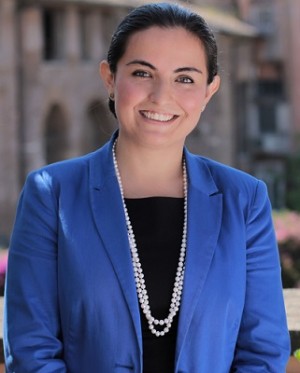
Maria del Pilar Murguia
Associate Dean
John Cabot University
Maria del Pilar Murguia was born in Bolivia and raised across Italy and Colombia! Her multicultural life experience allowed her to learn firsthand the challenges that living in different countries entails! With a business background, Pilar started working in International Higher education since June 2003 at John Cabot University, Rome, Italy. The focus of her work at JCU was and is to establish and maintain an environment that supports learning, encourages a strong sense of community, and promotes student development through active engagement in university life. She currently directly supervises the areas of Athletics, Outdoor Education Programs, Performing Arts, Student Activities and Trips, and Student Leadership Programs (OL, OSA, Student Clubs). She is part of the board of the Crisis Management Team of her University, as well as the University strategic planning committee.
Pilar is a certified Student Leadership Challenge practitioner, and her continued interest in intercultural leadership makes her curious about all new trends in the field. She is an active member AACUPI, NASPA, EUCA among other associations.
international symposium schedule
Schedule
All Day
- 9:00 am to 6:00 pm
Day One of the International Symposium
Day One of the International Symposium
- 9:00 am to 5:00 pm
International Symposium - Check-IN
International Symposium - Check-IN
Morning
- 10:00 am to 11:00 am
Welcome to the International Symposium
Welcome to the International Symposium
- 11:00 am to 12:00 pm
Keynote Address - Roger Ludeman
Keynote Address - Roger Ludeman
Afternoon
- 12:00 pm to 12:30 pm
Networking Activity
International Symposium Event
- 12:30 pm to 1:20 pm
Concurrent Sessions I
Concurrent Sessions I
- 1:30 pm to 2:20 pm
Saturday Lunch
Saturday Lunch
- 2:30 pm to 3:20 pm
Concurrent Sessions II
Concurrent Sessions II
- 3:30 pm to 4:20 pm
Concurrent Sessions III
Concurrent Sessions III
- 4:30 pm to 5:20 pm
Concurrent Sessions IV
Concurrent Sessions IV
Evening
- 5:20 pm to 6:00 pm
Day One - Closing Remarks
Day One - Closing Remarks
All Day
- 7:00 am to 5:00 pm
Day Two of the International Symposium
Day Two of the International Symposium
- 7:00 am to 12:00 pm
International Symposium - Check-IN
International Symposium - Check-IN
Morning
- 8:00 am to 8:50 am
Breakfast Buffet
Breakfast Buffet
- 9:00 am to 9:30 am
Opening Session
Opening Session
- 9:30 am to 10:20 am
Concurrent Sessions V
Concurrent Sessions V
- 10:30 am to 10:50 am
Global Exchange
Global Exchange
- 11:00 am to 11:50 am
Keynote Address - Baishishki Taylor
Keynote Address - Baishishki Taylor
Afternoon
- 12:00 pm to 1:00 pm
Plenary Session
Plenary Session
- 1:00 pm to 2:30 pm
Luncheon
Luncheon
- 2:30 pm to 3:20 pm
Concurrent Sessions VI
Concurrent Sessions VI
- 3:30 pm to 4:00 pm
IEKC Awards
IEKC Awards
- 4:00 pm to 4:30 pm
Symposium Closing Remarks
Symposium Closing Remarks
- 4:30 pm to 4:50 pm
Flag Processional
Flag Processional

